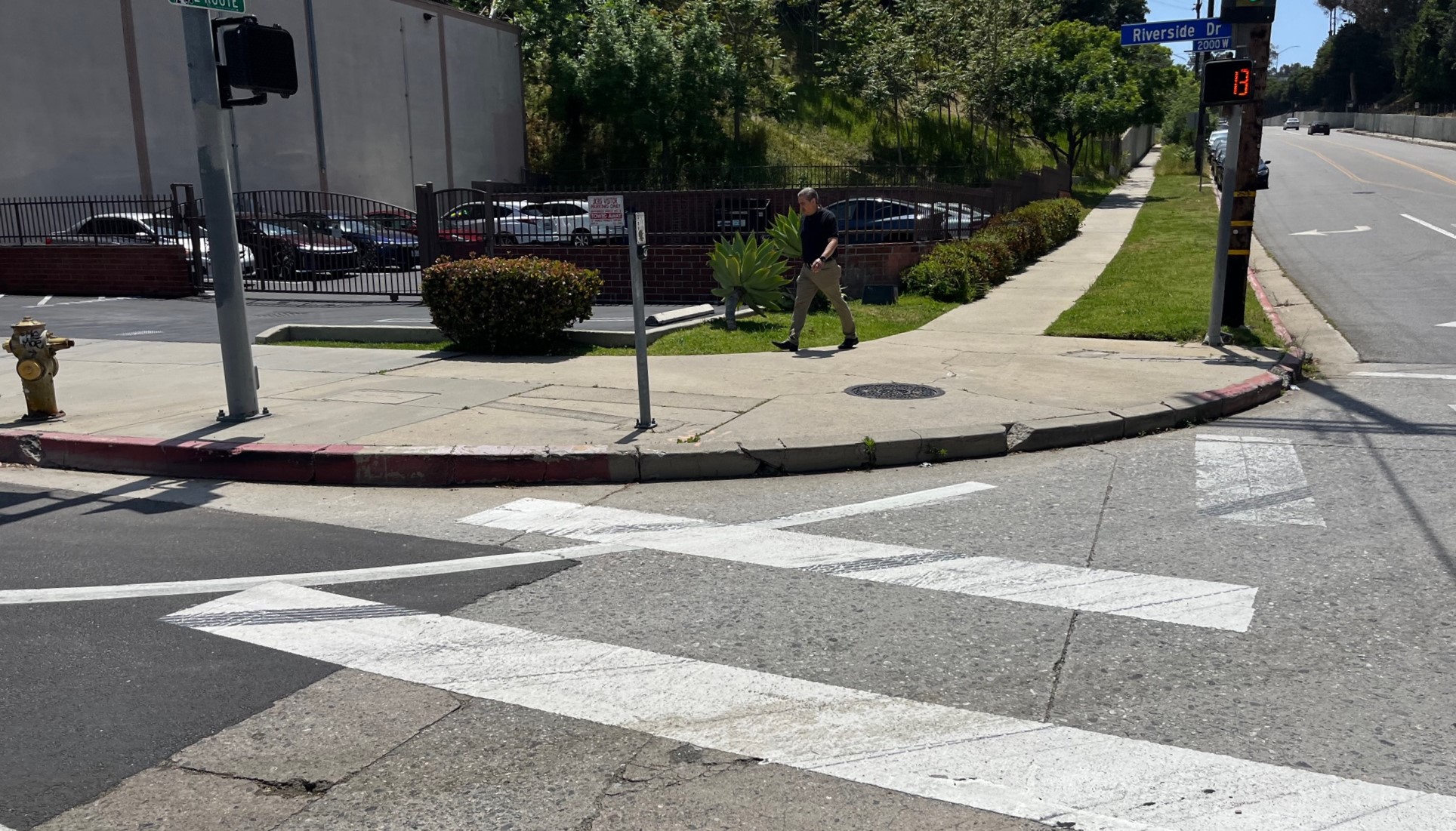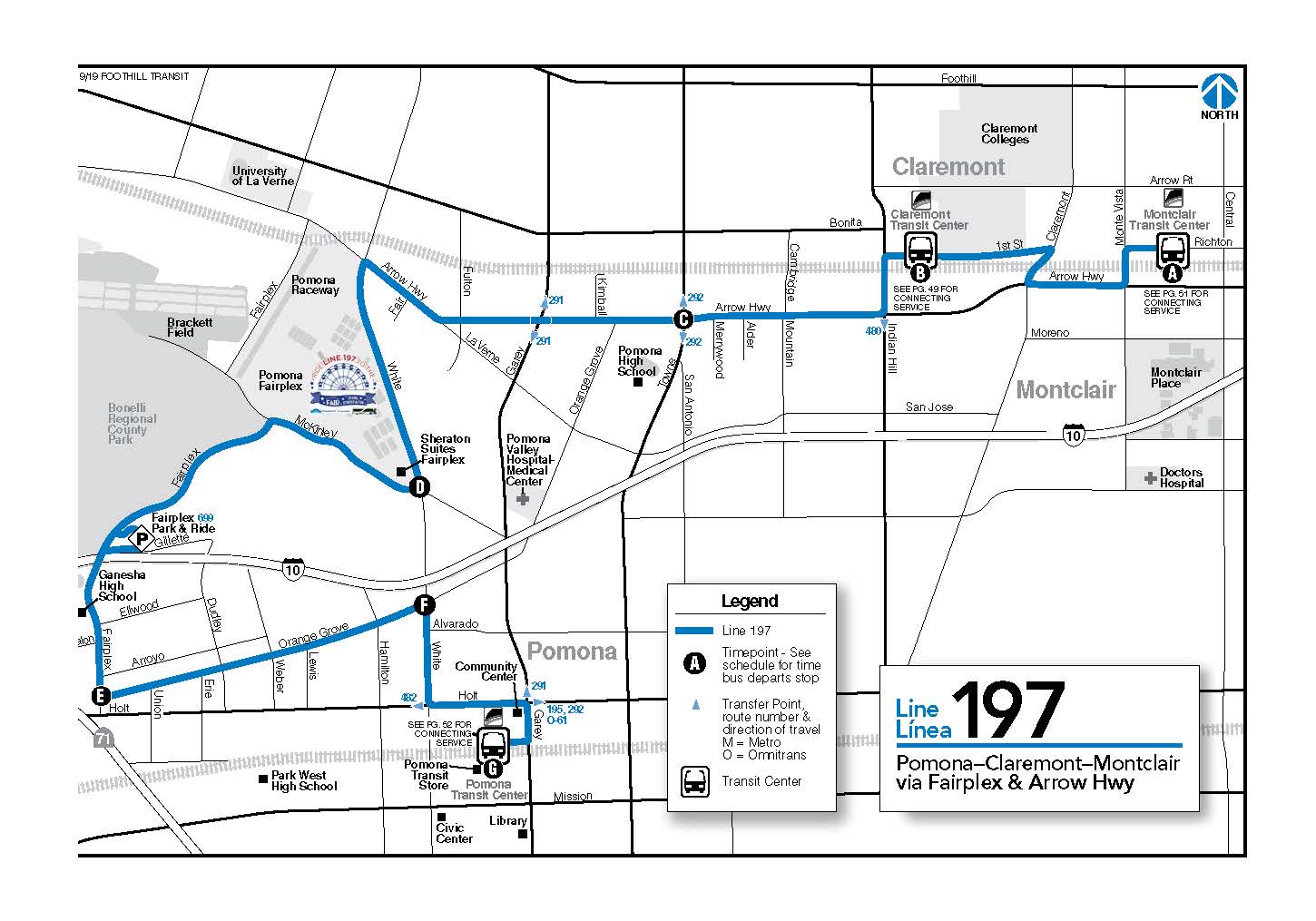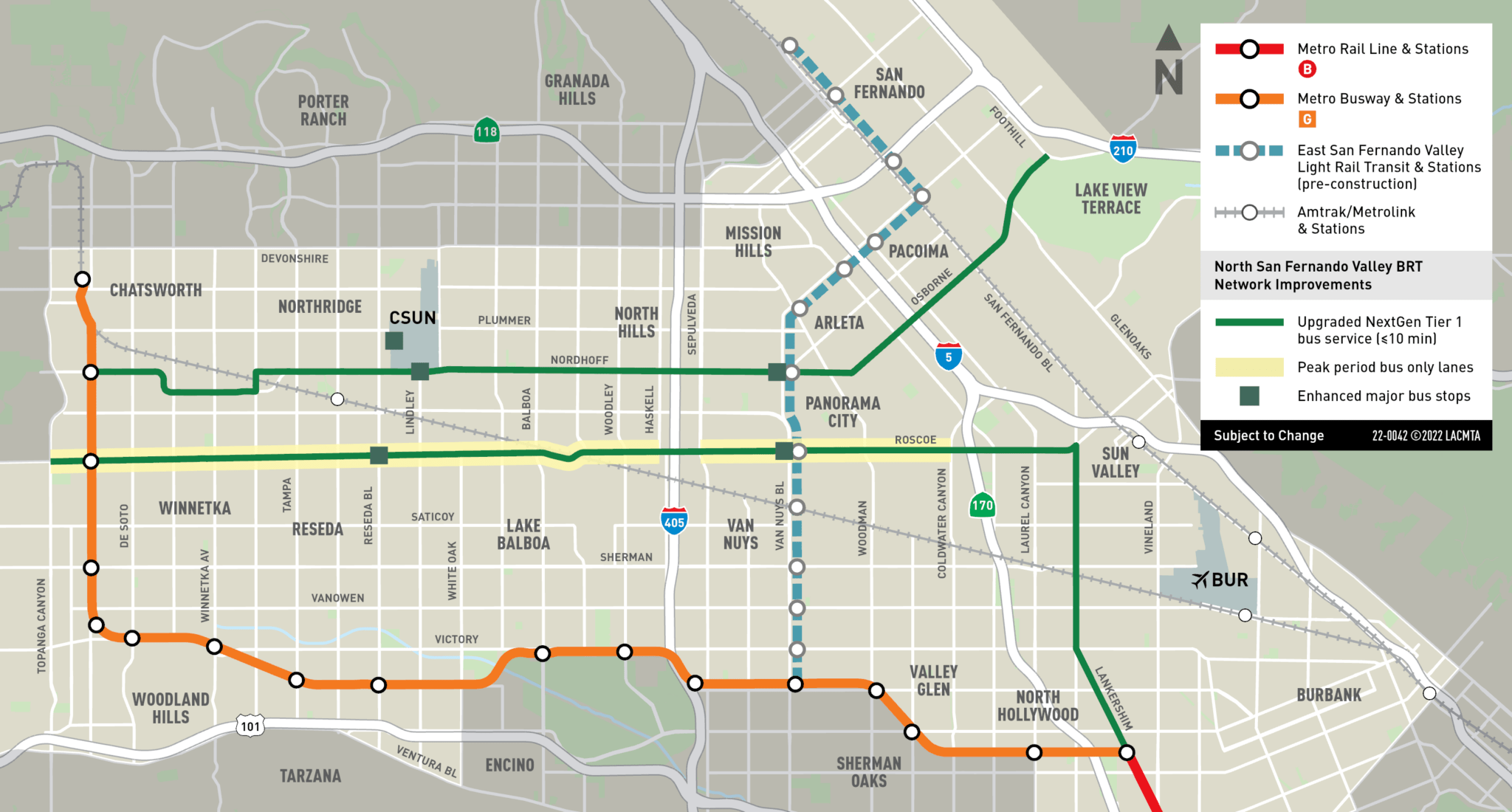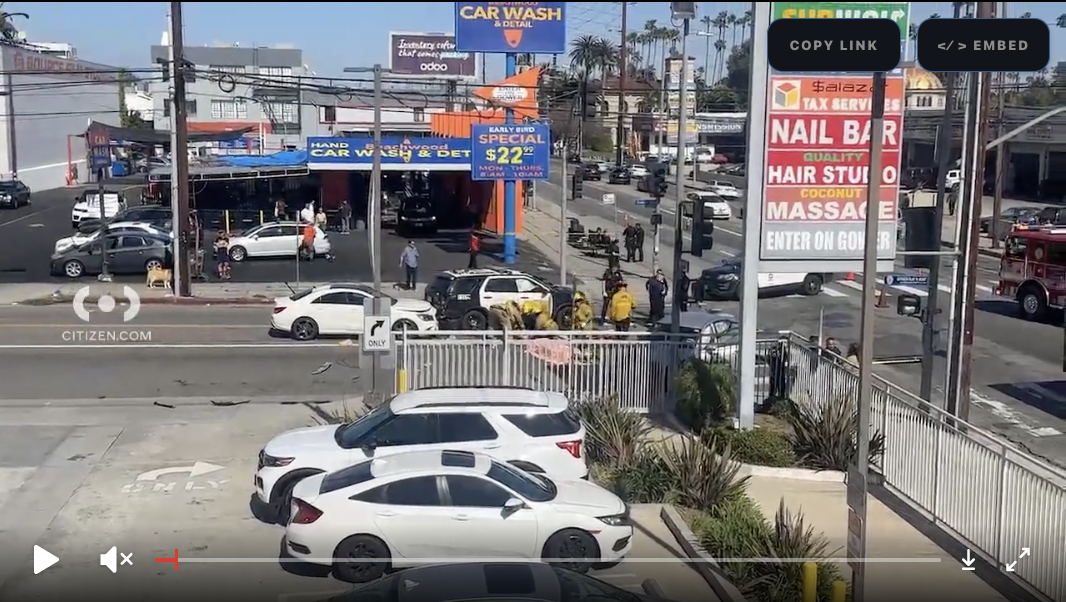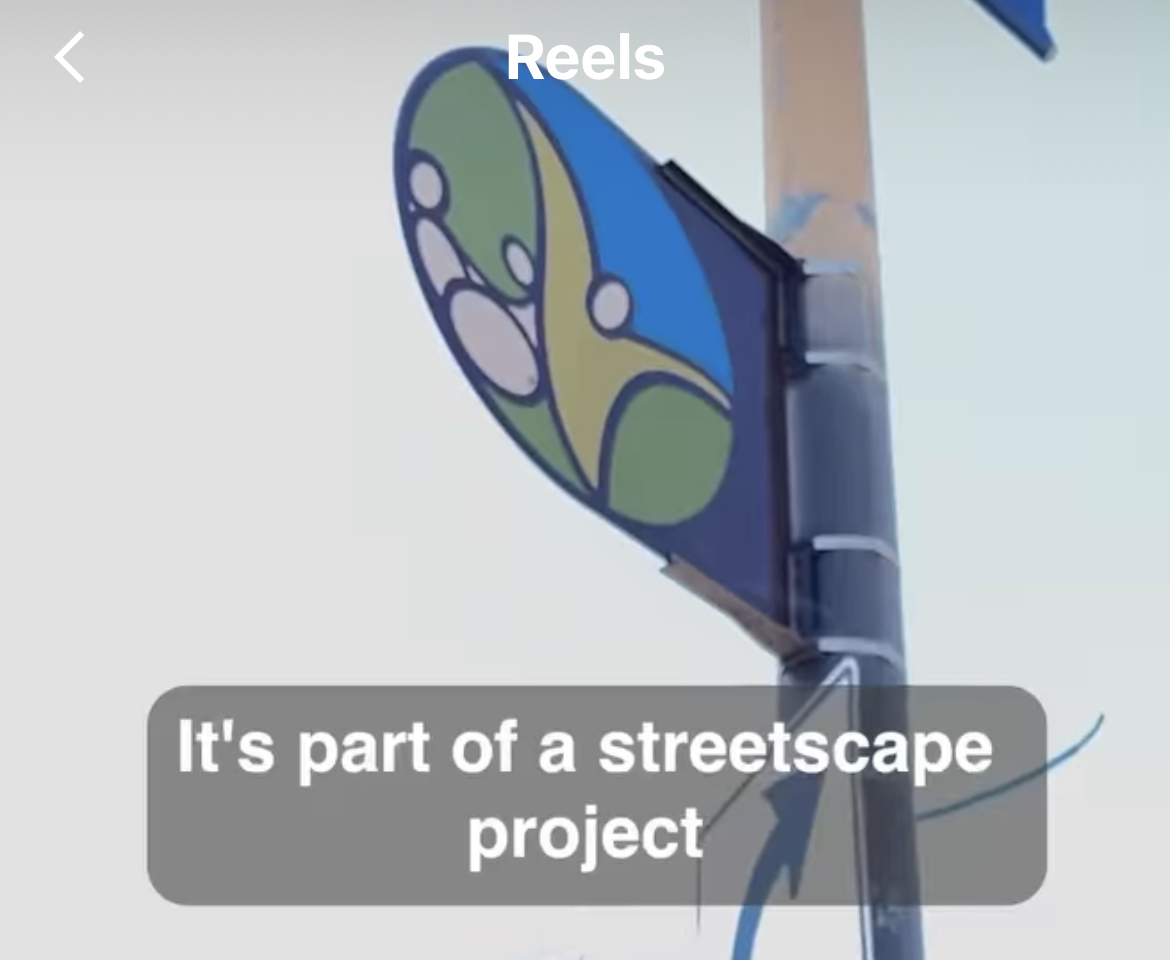May Protest Update: Metro Refused Some Mutual Aid Requests, Most Bus Damage Was Minimal
5:15 PM PDT on August 6, 2020
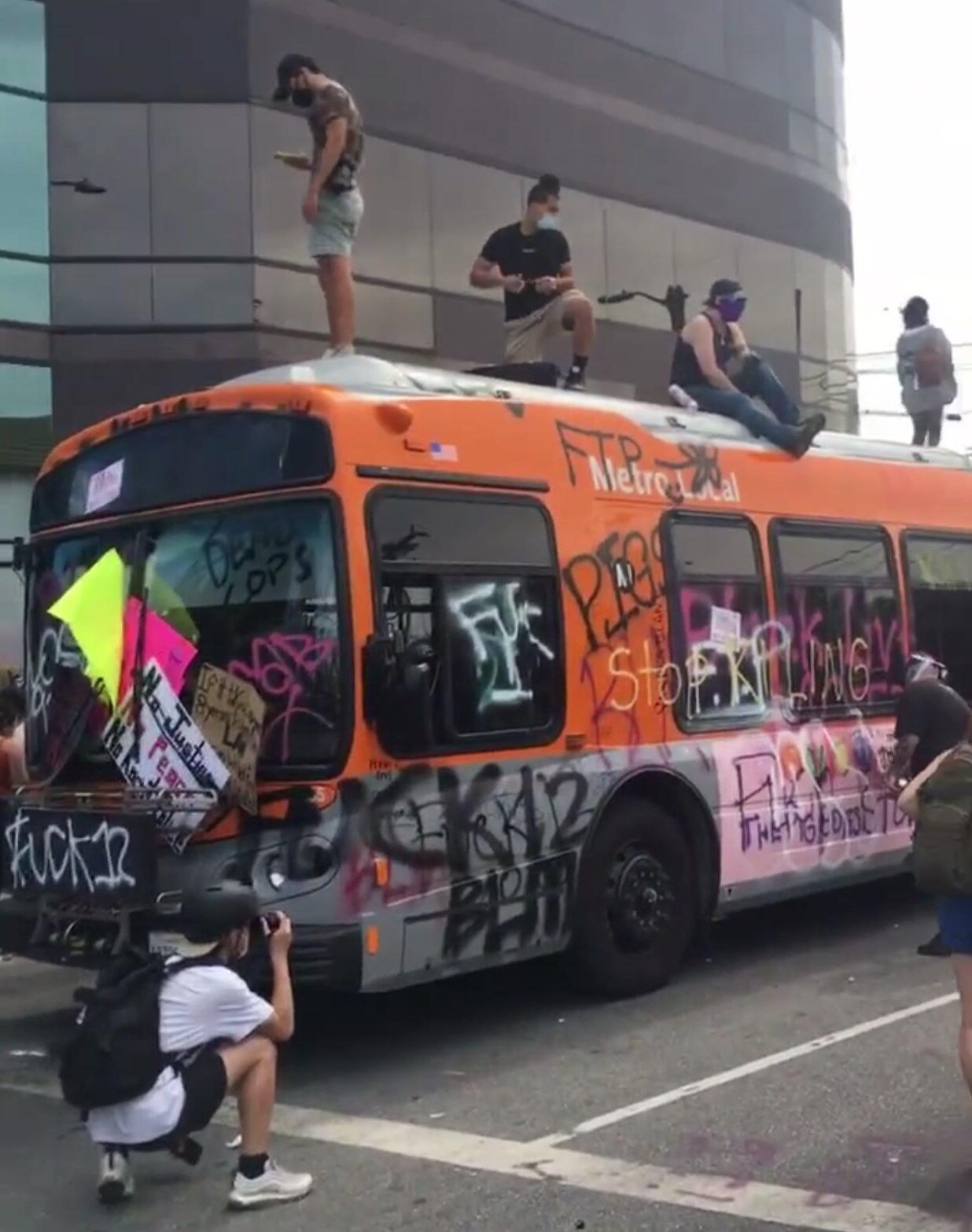
The one heavily damaged Metro bus on Beverly was an outlier – Photo via Reddit user kaykakis
Some new details are emerging about Metro's shuttling of protesters and damages done to Metro buses during May/June Black Lives Matter protests.
On Monday, May 25, Minneapolis police officers killed George Floyd. Video of Floyd gasping for breath and calling out for his mother while officers knelt on his neck and back quickly went viral, catalyzing protests worldwide, including throughout southern California. In Los Angeles that week, the bulk of the protesting took place downtown. Then, on Saturday, May 30, protesters peacefully convened in Pan Pacific Park in L.A. City's Fairfax neighborhood. When they took to Beverly Boulevard, however, they were soon met with a large police presence. As the standoff dragged on and stores in the surrounding area began to see some looting, Mayor Eric Garcetti declared a curfew for 8 p.m. that night, allowing LAPD to detain hundreds of protesters, the vast majority of whom were later released without charges.
That same night, Metro suspended bus service throughout L.A. County. Metro also turned over buses to LAPD to transport detainees.
The next day, Metro apologized to stranded riders. The agency issued a further explanation of its actions in a June 1 post on The Source titled, Metro explains decision to suspend service Saturday night and law enforcement’s use of our buses. Per the post:
We’d like to explain our decision to suspend service Saturday and another issue that has been rightly questioned: the use of Metro buses by the LAPD to transport those who had been arrested.
Both of these situations were criticized by riders and questioned by the media.
On Saturday afternoon, a Metro bus was trapped in the Fairfax District among protest crowds, threatening the safety of our operator. The bus was vandalized extensively. We’ve had about 62 buses damaged, including many in downtown Los Angeles on Friday night. That, of course, impacts our ability to provide transit service to our customers.
...service suspension occurred at the same time local law enforcement requested our agency to provide eight Metro buses to transport detainees that night. Metro is required by law to provide mutual aid in times of emergencies.
We recognize the incongruent and unfortunate optics of this situation — taking transit services away from riders while providing our equipment for other purposes. We were asked to provide six buses tonight and we did so. We have asked authorities to exhaust their resources first before requesting our vehicles.
It is not Metro’s choice to provide these buses. And to be clear about Saturday night: Metro’s decision to suspend service was based solely on public safety and had nothing to do with law enforcement’s request to utilize Metro buses to transport detainees.
Metro's actions were indeed criticized by riders and the media, as well as by advocacy organizations and local leaders. A joint statement from The Alliance for Community Transit, Investing in Place, and Los Angeles Walks called Metro's decision to suspend service and transport protesters “unacceptable” and "outrageous." L.A. City Councilmember and Metro Boardmember Mike Bonin called the suspension “unconscionable.”
Some new details are now emerging about what Metro did and didn't do. Metro didn't necessarily lie about its actions, but - as with various companies, agencies and individuals - its initial statement tried to cast the agency's actions in a somewhat better light than they actually deserve.
Records of @metrolosangeles' cooperation with LAPD. Looks like 23 buses were diverted to support crackdowns on protests (over 1% of the Metro-owned bus fleet in peak operation!). Metro loaned 4 buses even after this was posted: https://t.co/ewcEEfnLYL pic.twitter.com/6erzhYo9zh
— Jacob Wasserman (@JacobLWasserman) August 5, 2020
On Twitter this week, Jacob Wasserman shared some public records that contradict Metro's justification that providing buses to LAPD was "required by law" under mutual aid agreements. Per Wasserman's documents, Metro denied two of these mutual aid requests: a city of Beverly Hills request on May 31 and an LAPD request for four drivers on June 1. Wasserman shared documents showing that Metro provided buses to the LAPD on four dates, and that buses transported LAPD personnel on two dates:
- 13 buses on May 30
- 3 buses on May 31
- 3 buses on June 1 - includes one bus to transport LAPD (this contradicts Metro's statement, see above, that it provided six buses that night)
- 4 buses on June 2 - includes one bus to transport LAPD
At the time, the media had been reporting that transit agencies in other U.S. cities had transported police personnel; the fact that this took place in L.A. is news. It had not been reported by media or by Metro to date. As Wasserman notes, Metro continued to provide buses for detainees and police, even after the agency asked "authorities to exhaust their resources first before requesting" Metro buses.
After the criticism Metro received, director Bonin shepherded a motion that directs the agency to "review its commitments under the mutual aid agreement and seek amendments, if necessary, to ensure that Metro assets are only required for civilian transportation purposes." This report back is due in September.
Streetsblog has obtained more details on the damages done to buses that night. Metro's June 1 statement mentions that one "bus was vandalized extensively" on May 30, then mentions "about 62 buses damaged" in that week's protests.
There was indeed one bus (number 8465) that was surrounded by protestors on Beverly Boulevard, abandoned by its operator, and "heavily damaged," in the words of Metro spokesperson Brian Haas. Photos of that bus appeared on social media, some with protestors that had climbed on top of it. Per Haas, that bus needed $61,000 worth of repairs and also "needed to be towed, since four of the six tires were flattened."
The rest of the damaged buses, per Haas, "were were still able to be driven away." As of last week, 8465 was "the only bus that is still out of service as it awaits a full paint job."
What about the other 61 buses damaged?
Haas reported May 29-June 1 protest bus damage at a total of $100,423. Bus 8465's $61,000 was very much an outlier; one bus that accounted for nearly two-thirds of the total. The next most damaged bus needed just $5,000 worth of repairs. Only a dozen buses had damages over $1,000. Average bus damage was about $1,500, but median bus damage was only $331.
Of the 62 buses Metro reported damaged, 53 just had graffiti - including some spray paint and window etching. For those 53 buses, most cost Metro $196-331 to fix, though some with more extensive exterior spray paint and window etching cost up to just over $1,000.
According to Haas, in comparable months in 2019, Metro graffiti damage ran $110,000-$173,000 per month, which works out to roughly $5,000 per day. Given COVID-19 reduced operations, the comparison is certainly not exact. Essentially, if the accounting omits damages that were within the range of what Metro experiences during typical operations, Metro only had about a dozen buses damaged during the protests.
$100,000 worth of damaged buses is not a good thing. As Metro stated, bus damage "impacts our ability to provide transit service to our customers." Though Haas reports that all damages were covered by Metro's insurance, ultimately taxpayer monies go to repair damage. That money could be better used for other Metro expenditures.
There was one bus that had been "vandalized extensively," but Metro lumping that in with "62 buses damaged" is a bit misleading. Metro made it sound like the situation was worse than it actually was, playing into the media's fixation on relatively minor looting and property damage, when the story at hand was by-and-large peaceful protests.
See this Google spreadsheet for Metro's accounting of all the bus damage that took place during the late May and early June protests.
Stay in touch
Sign up for our free newsletter
More from Streetsblog Los Angeles
No, L.A. City Does Not Always Add Required ADA Ramps During Resurfacing, But They Should
StreetsLA GM Keith Mozee "Any time we do street resurfacing, it is considered an alteration, which requires ADA ramps to be installed."
LAPD Was Crossing Against Red Light in Crash that Killed Pedestrian and Injured Six in Hollywood
The department says the officers had turned on their lights and sirens just before crossing, but won't say why they did so.
